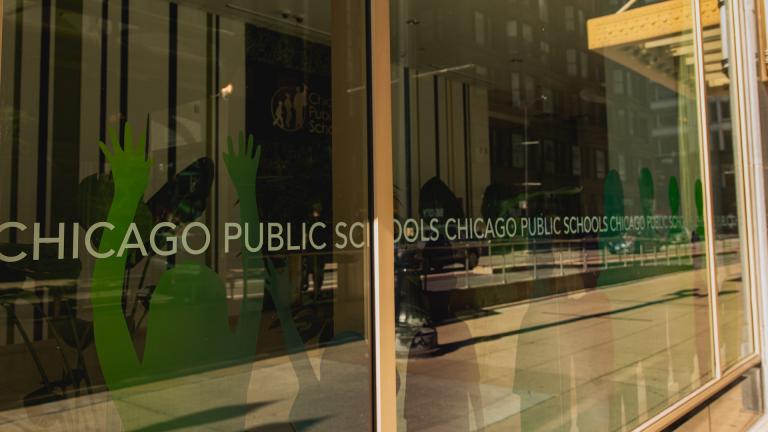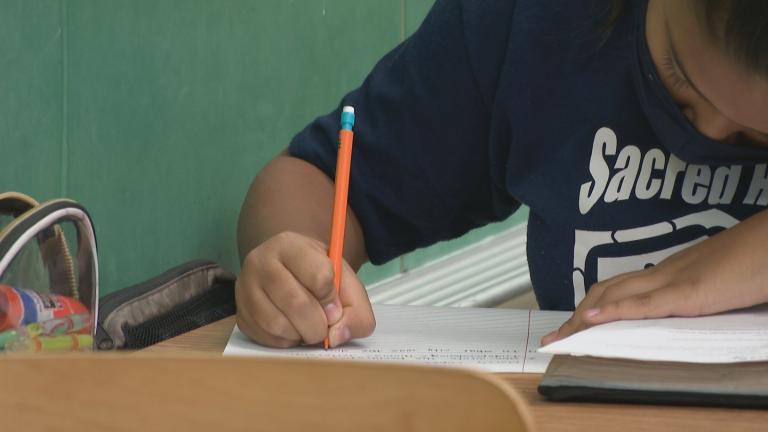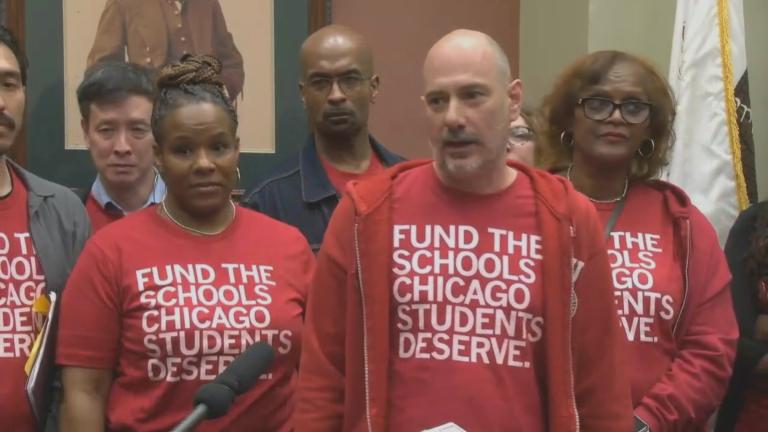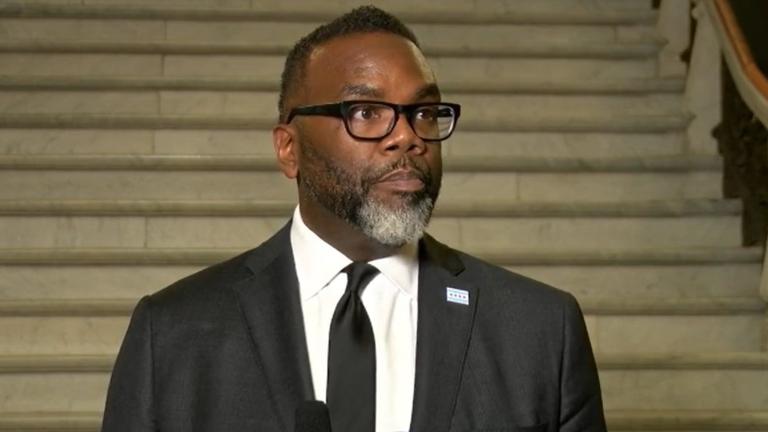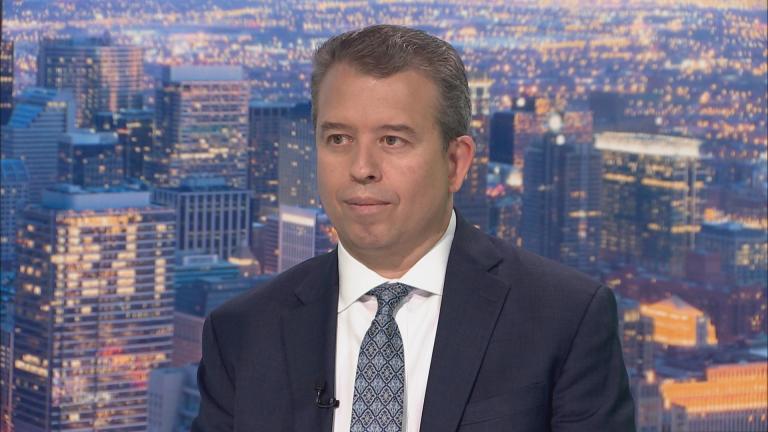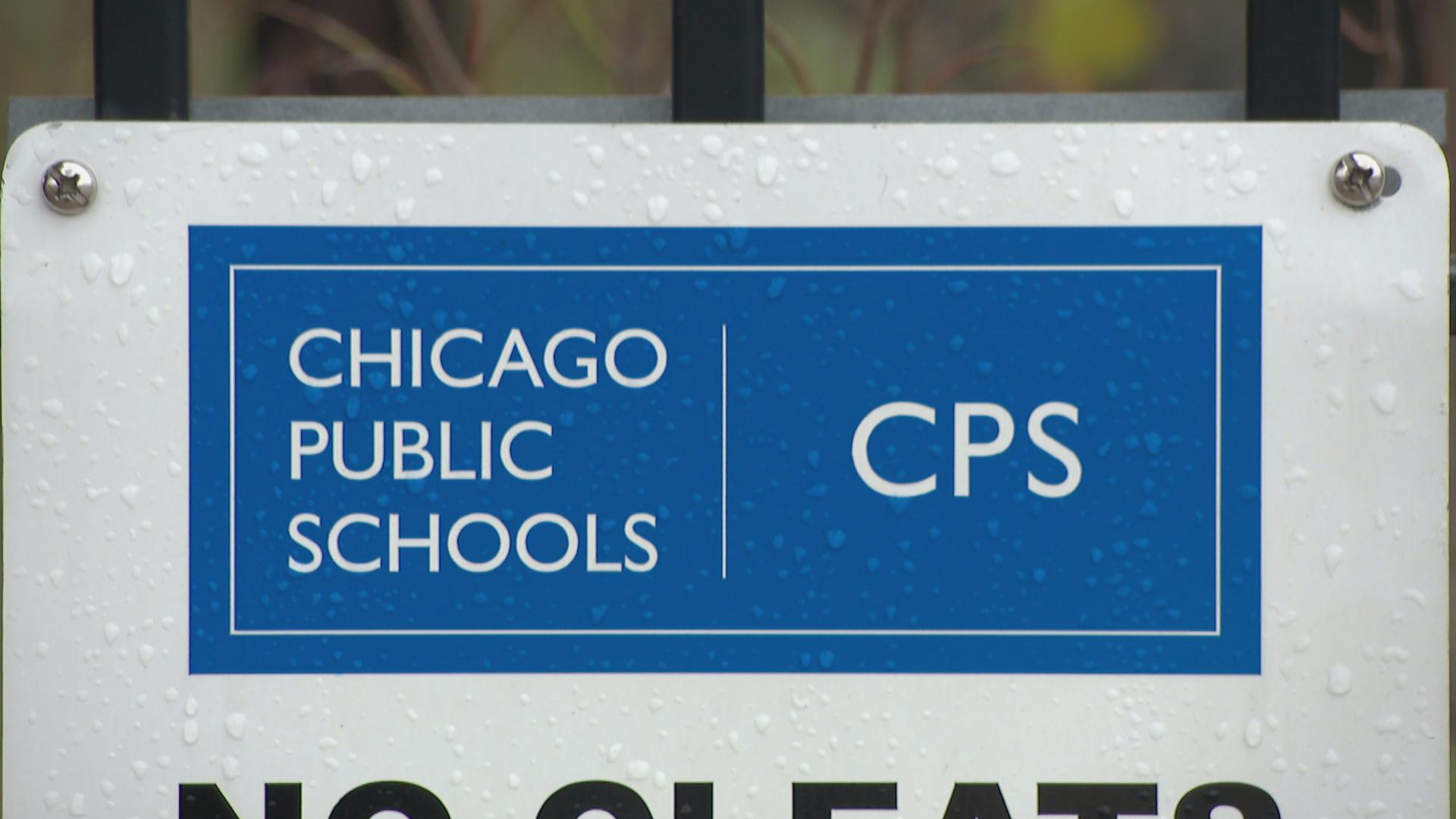 (WTTW News)
(WTTW News)
Mayor Brandon Jonson will retain majority control of Chicago Public Schools throughout his first term under a measure that’s one step away from becoming law.
That measure gives city residents the opportunity in November to vote for half of the Chicago Board of Education. The model allows Johnson to appoint the other half of the board, plus its president. Voters will then get the chance to elect the entire board in the 2026 election.
The Illinois House of Representatives voted 75-31 on Thursday to approve the plan. The state Senate approved the plan Tuesday.
Gov. J.B. Pritzker alluded he would sign it into law.
“It seems right to me that the people who live in a district ought to be able to vote for the people who would represent their children and the future of the region,” Pritzker said at an unrelated event. “Whether it’s hybrid and leads to a fully elected school board — which I think is what they’re voting on today — or one that would be, and I had only imagined that it would be, a fully elected school board. Either way, I think the city of Chicago is doing the right thing. The city, the Chicago Public Schools, will be better led by people who are representative of the people and not just appointed by the mayor of Chicago.”
A 2021 law established a Chicago elected school board — but left out details about many of the mechanics of the transition.
The proposal that will next go to Pritzker settles those questions, though not to the satisfaction of many community groups and Chicago residents who decry Springfield’s actions as untransparent and said delaying a move to a fully elected board is anti-democratic.
“We cannot turn back the clock by having our right to vote for our representatives taken away and back in the hands of City Hall,” Auburn Gresham resident Doris Murray said in a statement. “Mayor Johnson needs to trust the people, especially those who elected him on the promise of greater democracy and transparency in our schools.”
The proposal designates 20 districts that school board members will represent. But districts initially will be grouped together into 10 larger districts, with voters from two paired smaller districts choosing a single board member.
When Johnson then makes his appointments, he must choose board members who reside in each of the 10 smaller districts where none of the 10 elected members live.
Chicago resident Valerie Leonard, co-founder of Illinois African Americans for Equitable Redistricting, said that even though everyone in Chicago will be able to cast a vote, the pairing of districts means that only half of Chicagoans will get to elect a neighbor, while the other half will be represented by a mayoral appointee and will have to vote for someone who doesn’t live in their community.
Leonard told lawmakers the process is “convoluted,” “confusing to voters” and will decrease participation and lead to voter suppression.
Critics said the transition timeline is a “Trojan horse” that empowers the Chicago Teachers Union. Before becoming mayor, Johnson worked as a CTU organizer.
State Rep. Blaine Wilhour, a Republican from downstate Beecher City, called the plan a “blatant power grab masquerading as reform. Only here in Illinois could we twist something as noble as elections into a tool for political cronies to tighten their grip on our system.”
The measure’s sponsor, state Rep. Ann William (D-Chicago), said it’s a false narrative. She argued if the goal was to empower the mayor’s allies, the legislature could have left CPS leadership as it currently stands, a system in which the mayor has full appointment powers.
Williams, who represents portions of the city’s North Side, said two years of a half-elected, half-appointed school board will allow for a smooth and orderly transition before shifting to a fully elected school board. She noted that CPS is a massive system that educates some 325,000 students.
State. Rep Bob Morgan (D-Deerfield) expressed frustration with the district’s leaders for “turning a blind eye” to “rising antisemitism” in CPS, pointing to posts by teachers on social media and alleging that “Jewish students feel unsafe in Chicago Public Schools.”
Students staged a walkout in January to call for Israel to cease its war in Gaza following the October attack in Israel by Hamas. As WTTW News reported, the U.S. Department of Education is probing CPS for civil rights violations believed to be related to that protest.
“If elected leaders and teachers union leadership in Chicago refuse to hold people accountable for this hatred, I trust the public to do that,” Morgan said. “I support this legislation as it will bring accountably that has long been lacking in the Chicago Public Schools.”
State Rep. Jaime Andrade (D-Chicago) voted for the plan, but called on Pritzker to delay signing it into law until the current CPS board, with members appointed by Johnson, clarifies its ongoing move away from selective enrollment and magnet schools.
Andrade said his daughter got into a selective enrollment school but is concerned the school won’t be the same in the future because of the board of education’s five-year plan.
The board in December approved a resolution that blames the school choice system for opportunity gaps in education and calls for a transformative vision that relies on “rethinking our entire theory of action, from a model which emphasizes school choice to one that supports neighborhood schools by investing in and acknowledging them as institutional anchors in our communities.”
“I ask my governor to not sign the bill until we get a response: What is their intentions?” Andrade said. “We, as a parent, deserve to know what is their intention for the next few years.”
Andrade is a co-sponsor of a bill (House Bill 5766) that would put a moratorium on changes to CPS’ selective enrollment until the fully elected board is seated in 2027. He called on Johnson to put his political heft behind that measure’s support.
“What we have come to witness over the past few days is a stark reminder that we live in Chicago, Illinois, and that ‘Progressive’ doesn’t mean the same here as it does in other places,” Leonard said in a statement of Thursday’s vote. “We have soon reverted to the politics of old, where the voices of the people, particularly Black Voters, are not on equal footing as others.”
But state Rep. Marcus Evans, a Democrat whose district covers parts of Chicago’s South Side, said until now the “voiceless” have been shut out, and he credits Johnson for putting City Hall’s backing behind letting Chicago residents run the city’s schools.
“Me being a father now, understanding the importance of having an impact, making decisions for my Black son, I want my community to make decisions for the Black community of Chicago, for the Latino community of Chicago, for every community of Chicago,” Evans said.
Contact Amanda Vinicky: @AmandaVinicky | [email protected]

